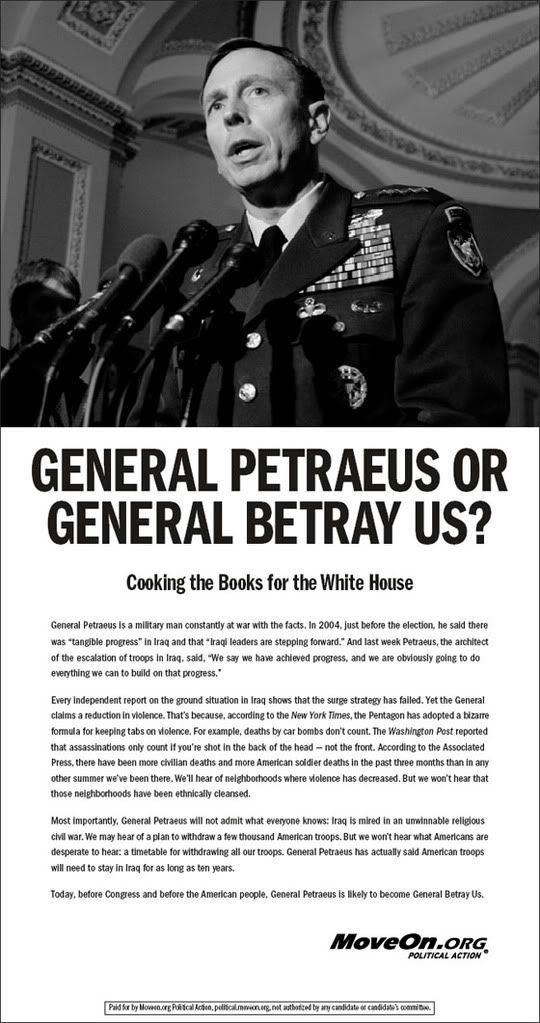
Democrats showing their support.
The Shameful Disenfranchisement of the Military in New York’s Congressional Race [Hans A. von Spakovsky]
Only 25 votes separate Republican Tim Tedisco and Democrat Scott Murphy in the special election for New York’s 20th district. That means the winner will be determined by 6,000 outstanding absentee ballots.
According to the Department of Justice, 1,300 overseas voters requested absentee ballots, 471 of whom are military voters. Unfortunately, it is the military voters who will probably end up being disenfranchised and having their votes discounted, thanks to the irresponsible New York Board of Elections and the half-hearted actions of the Department of Justice.
The problem for military voters in places like Iraq and Afghanistan is that it takes so long for absentee ballots to make the trip by mail from county election officials in the United States to bases in combat zones overseas and back again. As a result, only a tiny percentage of their votes get counted. Non-profit groups examining the issue of ballot delivery times and federal agencies like the U.S. Election Assistance Commission all recommend that absentee ballots be mailed to military voters at least 45 days before they’re due. The Chief of Operations for the Military Postal Service Agency recommends at least 60 days.
In New York, ten counties make up the 20th congressional district, and nine of them sent their absentee ballots to overseas voters too late for them to be received and returned in time to count in this election. One county mailed them on March 12 and eight counties mailed them on March 13, all by regular mail with only one exception — Essex County used an express mail service.
Under New York law, absentee ballots in this race had to be postmarked by March 30, the day before the March 31 election, and received by April 7. That left most military voters only 25 days to receive, mark and return their absentee ballots, which everyone agrees isn’t enough time, given overseas mail delays.
The Civil Rights Division of the Department of Justice, which is responsible for enforcing the federal statute that guarantees the right of overseas citizens and military personnel to vote by absentee ballot, contacted the New York State Board of Elections and requested that they issue their ballots sooner for this race. The two Republican members of the board voted to support this request. Yet the two Democratic members of the board, shamefully enough, voted against doing so. Were they trying to disenfranchise military voters?
The Justice Department then filed a federal lawsuit on March 24 against the election board and the governor of New York. But the requested remedy was nowhere near what should have been asked for to remedy this problem, and didn’t include any of the measures that we successfully asked for from other courts when I was at the Division coordinating DOJ’s enforcement of this statute.
The only thing DOJ leaders essentially asked for (and got in a consent decree) was an extension of time for the receipt of overseas ballots, from April 7 to April 13. In other words, despite the fact that almost every expert in this area now recommends at least a 45-day transit time for absentee ballots for military voters, Justice asked only for 30. Furthermore, when I was at the Division, we forced the career lawyers in the Voting Section to start incorporating modern technology advancements into the remedies we sought in these cases, something they seem to have already forgotten.
As a result, we obtained real, effective relief for military and overseas voters. In 2004, for example, we sued Georgia because numerous counties hadn’t mailed their absentee ballots in time to be received and returned by military voters. Not only did the judge provide an extension of time (like in the New York case), but we asked for and the judge ordered Georgia to send absentee ballots to overseas voters by facsimile and email, and to accept the returned, voted ballots at a secure facsimile machine under the supervision of the Secretary of State. While this compromised the secrecy of the ballot, it allowed voters to get their late-received ballots back in time to be counted, which was better than not having their vote count at all.
But to give them another option that protected the privacy of their vote, we forced Georgia to set up accounts with UPS and Federal Express that overseas voters could use to return their absentee ballots. This would get the ballots back in 2-3 days, instead of the minimum 12-18 days estimated for one-way transit. We also required Georgia election officials to notify every voter of these options by email, telephone or facsimile, using all available records to locate the overseas voters and their contact information.
The lawsuit filed in New York asked for none of these remedies. The DOJ leadership asked only for a five-day extension that won’t be effective in protecting the votes of military voters. It will, however, provide Justice with political cover so it can say it fulfilled its responsibility to military voters by filing suit to enforce the federal statute.
It doesn’t take much imagination to figure out who that ends up helping in a race with a 25-vote margin. Meanwhile, the voters who will end up being disenfranchised by New York election officials and inadequate enforcement by the Justice Department are the very Americans who put their lives on the line for the rest of us who reside safely here. This is shameful conduct.
[
The mystery as to why the dems have pissed on those who protect their cowardly, treasonous asses is revealed:]
UPDATE: My previous figure of 471 military voters in New York’s 20th congressional district was based on a Justice Department press release from March 26. I have received an update from a form distributed by the New York elections board indicating that as of April 1, there were 1,005 absentee ballots sent out to military voters. http://corner.nationalreview.com/post/?q=NjUwYWJmMTRjNDNlOWYyMTVhNTFiOGFjMWJhYTJkZWQ=